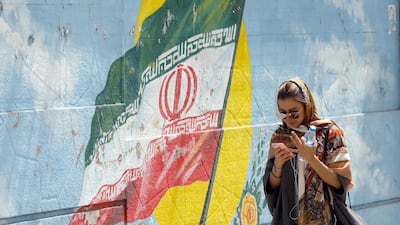Iran blocked encrypted messaging app Telegram on Tuesday, claiming that it was a measure necessary to protect national security.
The ban of the country’s most popular messaging app, announced on state television, comes after January’s protests across Iranian cities against worsening economic conditions.
The government in Tehran believes that the app, which is more secure than other forms of communication, is being used by opposition groups to organise anti-regime rallies.
Iranian state television said the ban took place because of “various complaints” allegedly made by Iranians about the app, coupled with the Iranian security services’ demand to “confront” the company’s activities.
The statement, published on the official website of the Iranian judiciary, said app users had engaged in "propaganda against the establishment, terrorist activities, spreading lies to incite public opinion, anti-government protests and pornography".
The ban came into effect on April 30 and restricts Iranian access to Telegram’s desktop and phone apps.
In a twist, Mohammad Javad Azari Jahromi, Iran’s minister of information and communication technology, appeared to rail against the decision, saying that the country was harming itself in blocking technology for its citizens.
"Administering sanctions against ourselves from the modern world will cause backwardness", he wrote on Twitter, the service banned for Iranians but open for senior officials.
Telegram scrambles messages, making law enforcement’s task of surveilling communications in the country increasingly difficult. President Hassan Rouhani has pledged to give Iranians greater freedom, but Tuesday’s decision will be seen as another case of him coming up short of his promises.
Twitter and Facebook have long been blocked for civilian Iranians, so many had turned to Telegram as an arena to receive updates and spread information. A concern for Tehran was that footage of January’s protests was being shared far and wide via the app.
The ban follows a similar decision by Russian authorities, who ordered the closure of the service after they had received a court order to do so.
Its Russian founder Pavel Durov refused to cooperate with the Russian government and hand them the encryption keys they would need to monitor messaging on the service. Thousands of Russians took to the streets on Monday, protesting the decision to shut down the service.
The Iranian ban comes into force just weeks ahead of US President Donald Trump’s anticipated May 12 decision about whether to remain in the Iranian nuclear agreement or to pull Washington out of the agreement.
It is expected that he will at least pull the US away from the deal and call for revisions to the agreement that he has long derided as one of the worst in history. He has argued that the pact has returned hundreds of millions to the Iranian regime that it can use to sponsor terrorist groups across the Middle East.

